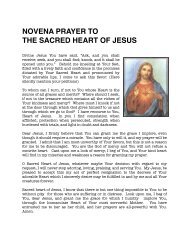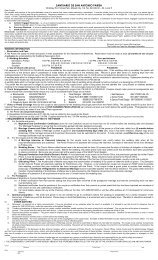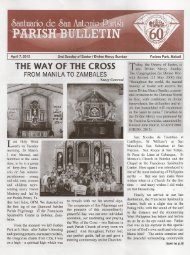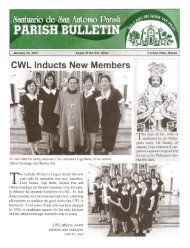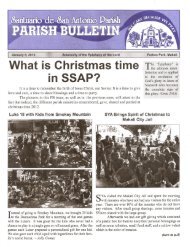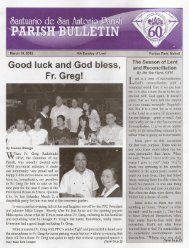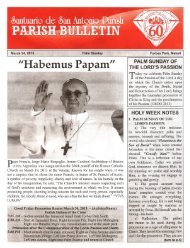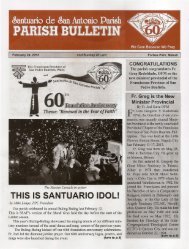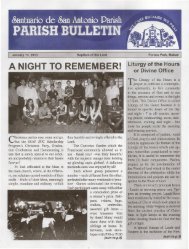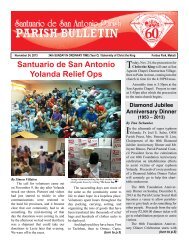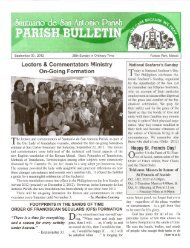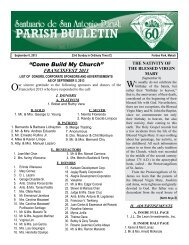The
July 28 - Santuario de San Antonio Parish
July 28 - Santuario de San Antonio Parish
- No tags were found...
You also want an ePaper? Increase the reach of your titles
YUMPU automatically turns print PDFs into web optimized ePapers that Google loves.
4 Parish Bulletin<br />
RANDOM THOUGHTS<br />
Voices from yesterday and today . . .<br />
By Peachy Maramba<br />
ST. MARTHA<br />
(First Century - d.c. 80)<br />
Patron of Cooks, Housewives,<br />
<strong>The</strong> Hospitality Industry, Hotel Workers, etc.<br />
July 29<br />
Are you a Martha or Mary? Martha and<br />
Mary were two sisters of Lazarus whom<br />
Jesus raised from the dead. <strong>The</strong>ir family,<br />
apparently one of some importance, was one<br />
of a few closest and beloved friends of Jesus<br />
mentioned in the Bible. In fact whenever<br />
Jesus was in Judea he frequently delighted in<br />
being guest in their home in Bethany, a small<br />
town two miles from Jerusalem. St. John<br />
himself tells us that “Jesus loved Martha and<br />
her sister Mary and Lazarus.”<br />
From the gospels of Luke (10: 38-42)<br />
and John (11-12) we get a clear picture of<br />
the characters of these two sisters such that<br />
in art and literature, there evolved a Martha<br />
type and a Mary type who portray two very<br />
different life styles. In religion they typify<br />
two kinds of religious devotion - the way of<br />
Martha and the way of Mary.<br />
Martha Type<br />
Of the two sisters we seem to get a more<br />
detailed picture of Martha presumably, the<br />
elder of the two, who seems to have had the<br />
chief care and direction of the household!<br />
<strong>The</strong> Martha type exemplifies the typical<br />
devoted, generous, conscientious and<br />
hardworking housewife. St. Luke tells us<br />
that she was always solicitous and concerned<br />
about giving the best possible service and<br />
hospitality to her guests especially to a very<br />
special guest as Jesus. She therefore serves<br />
as an example of the virtue of hospitality.<br />
She is always solicitous of and attentive to<br />
everyone’s needs. However in her efforts to<br />
do this she seeks cooperation and concerted<br />
effort and gets vexed when she doesn’t get it.<br />
In short she typifies the energetic, practical and<br />
positive person. She is the prototype of the<br />
very active and possibly activist Christian.<br />
Mary Type<br />
On the other hand the Mary type contrasts<br />
sharply with the active ever practical Martha<br />
type. She seems to be the prototype of the<br />
reflective, meditative and contemplative<br />
person. Appearing more reserved and devout<br />
she is more preoccupied with spiritual matters<br />
than ordinary house chores.<br />
<strong>The</strong> Need to Prioritize<br />
It was during Jesus’ last visit to Jerusalem<br />
when the sisters entertained Jesus in their<br />
home the last few days before the Passion that<br />
the famous incident told by Luke (10:38-42)<br />
took place.<br />
While Martha was stuck with the chores,<br />
Mary sat at the feet of the Lord raptly listening<br />
to his every word. Martha, burdened with<br />
work, came complaining to Jesus expressing<br />
irritation at her sister’s idleness. She said,<br />
“Lord, do you not care that my sister has left<br />
me by myself to do the serving? Tell her to<br />
help me.”<br />
While Jesus was very well pleased with<br />
the love and devotion with which Martha<br />
waited on Him, yet Jesus chided her and<br />
softly rebuked Martha for her somewhat<br />
overanxious bustling spirit which led her to<br />
pay more attention and put more emphasis on<br />
worldly matters such as the bodily comfort of<br />
her guests than to His message of salvation.<br />
So Jesus said, “Martha, Martha you are<br />
anxious and troubled about many things.<br />
<strong>The</strong>re is need of only one thing. Mary has<br />
chosen the better part (which is of the greatest<br />
importance, the attendance of the soul on<br />
God) and it will not be taken from her.” (Luke<br />
10:42). Jesus added, “Eternal salvation is our<br />
only concern.”<br />
It seems that of the two areas of life<br />
commonly thought of as the practical and the<br />
contemplative, Jesus chose as the “better part”<br />
the contemplative, reflective and meditative<br />
part. It was as if Jesus were endorsing the<br />
value of a life of adoration and heavenly<br />
contemplation where the heart is wholly taken<br />
up in God and united to Him by worship and<br />
love over a life of active works that allows no<br />
time for thought or prayer as then often the<br />
soul is distracted or concerned about worldly<br />
cares only. And yet it would not be the “better<br />
part” if the practical side of life was not<br />
running smoothly. So we actually need to<br />
balance and blend the two areas of life.<br />
But Jesus is stressing the need to prioritize.<br />
While it is good to be busy and to work hard<br />
we must always remember that God should<br />
always come first taking precedence over all<br />
these actions because God is the “only one<br />
thing necessary.” He should be our first and<br />
foremost priority and eternal salvation our<br />
only concern.<br />
A Devoted Follower<br />
Yet while Mary seems to be the more<br />
devout of the two sisters always sitting at our<br />
Savior’s feet feeding her soul with heavenly<br />
doctrine, it would seem that in the story of the<br />
raising of her dead brother Lazarus to life it<br />
was Martha who emerges as the more devoted<br />
follower and a woman of deep faith.<br />
When Jesus finally arrived after Lazarus<br />
had already been dead for four days and was<br />
in fact already in a tomb and the house was<br />
filled with mourners, it was Martha who came<br />
running out to greet Him while Mary remained<br />
at home (John 11:20). Naturally expressing<br />
her regret and disappointment at His not being<br />
there to prevent Lazarus’ death nonetheless she<br />
expressed great faith that whatever He asked<br />
of God, God will give Him. “Lord, if you had<br />
been here, my brother would not have died.<br />
But even now I know that whatever you ask<br />
of God, God will give you” (John 11: 21-22).<br />
Because of this act of faith and unbounded<br />
trust in the Lord’s divine power, she was the<br />
first to hear one of Jesus’ deepest revelation.<br />
When Jesus assured her that her brother would<br />
rise again Martha thought He meant at the<br />
resurrection on the last day. <strong>The</strong>n Jesus made<br />
His startling statement on the continuation of<br />
life after death: “I am the resurrection and the<br />
life; whoever believes in me, even if he dies,<br />
will live and everyone who lives and believes<br />
in me will never die.”<br />
When Jesus asked Martha if she believed<br />
this she replied with a magnificent act of<br />
Faith when she unhesitatingly answered,<br />
“Yes, Lord, I have come to believe that you<br />
are the Messiah, the Son of God, the one who<br />
is coming into the world.” So not only did<br />
(turn to p. 5)



